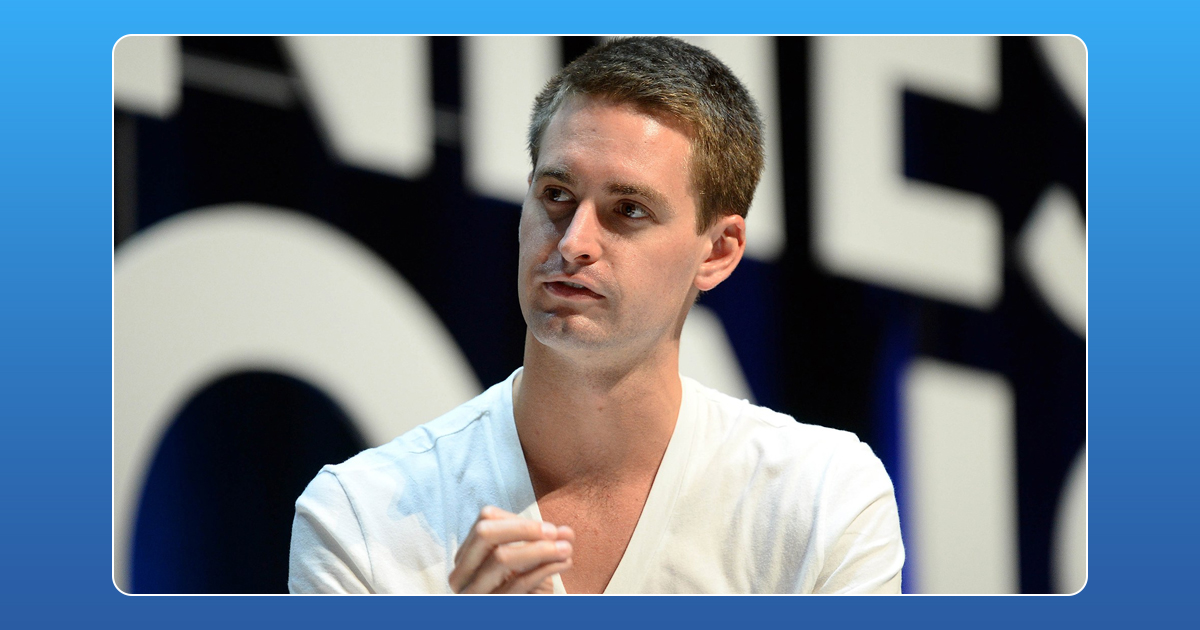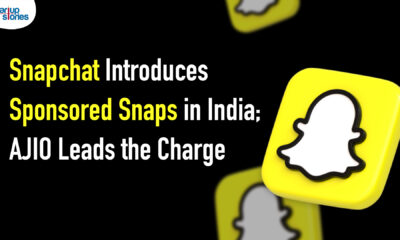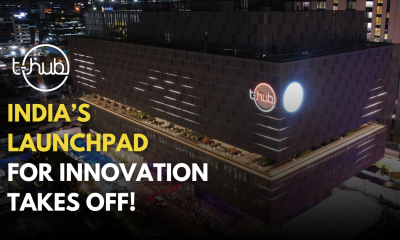Latest News
Snapchat CEO Denies ‘India Is Poor And The App Is For Rich’ Comment!

Snapchat Inc. CEO Evan Spiegel now, denies on his comments after his ex-employee made allegations on him that he commented Snapchat to be an “app for rich people” and India is a not profitable market for Snapchat expansion as it is a poor country.
A twenty-page document, filed by an ex-employee of Snapchat, Anthony Pompliano, presented an extract which exposed the style of work. He sued the company on the work style which was being carried out under Evan’s Supervision was questionable and is uncertain. The extract of the allegation is that the CEO of Snapchat Evan Spiegel reacted Saying “this app is only for rich people. I don’t want to expand into poor countries like India and Spain.”, On being said that the performance of Snapchat in Foreign Markets is poor.
Snap Inc., with official documents, opposed the claims and further said, “This is ridiculous. Obviously, Snapchat is for everyone! It’s available worldwide to download for free.”
There was also a clarification released to the press on Pompliano’s Section with regards to the allegation that Snapchat were showing inflated numbers to its investors. “In the notice, we filed with the court when we unsealed Pompliano’s original complaint (attached), we wrote: ‘Snap did not give investors misstated user metrics back in 2015; nor did Snap employees commit any of the panoplies of alleged bad acts that litter Pompliano’s complaint. Snap will demonstrate as much at the appropriate time in the appropriate forum’,” says the statement.
It was stated that Evan, traveled to speak at the Economic Times Startup Awards in 2015, and also is a leading Entrepreneur, especially in India.
Pompliano’s Statement disturbed a considerable number of Snapchat users from India, carrying the hashtag “BoycottSnapchat“ basing on social networking sites, provoking the users to rate the app with one star and uninstall the app to show opposition. As a result of people’s reaction to defend their nation from a statement which is not proved by the court of law, the app ratings fell short instantly. The Google Play store showed one-star ratings in a big number for snap chat and the Indian Users’ comment threads countered his statement.
A few users also commented on the portals which said that India is hard geography for monetising. “A true but hard fact is that the Indian market does not monetize well! Average revenue per user is way too low in comparison to the cost of acquiring a customer,” says Facebook user Ravindra Sonavane. This opinion, somehow, could not influence the snapchat users. Evidently, many users are participating in the protest.
Latest News
Peak XV New Funds: $1.3B Commitment for India Startup Surge 2026

Peak XV Partners has launched three new funds totaling $1.3 billion, targeting India’s booming startup ecosystem. The lineup features the $600M Surge fund (8th edition) for early-stage ventures, a $300M Growth Fund for Series B+ scaling, and a $400M Acceleration Fund for rapid portfolio expansion. This commitment arrives as India’s VC inflows rebound, with AI and fintech leading 2026 trends.
These funds build on Peak XV’s legacy of backing unicorns like Zomato and Pine Labs, offering founders capital plus strategic guidance amid post-winter recovery. Early-stage deals surged 20% last year per Tracxn, positioning Peak XV to fuel the next wave of innovation in SaaS, climate tech, and consumer plays.
For startups eyeing Peak XV new funds or Surge fund 2026 applications, this signals prime opportunities. Investors and marketers should watch for deployment updates India remains a global VC hotspot.
Latest News
D2C Brand Neeman’s Raises $4 Million for Tier 2/3 Store Expansion & Eco-Friendly Shoes

Hyderabad, January 13, 2026 Neeman’s, India’s leading D2C footwear brand famed for sustainable shoes and patented PIXLL® technology, has raised $4 million from existing investors. This funding boosts its cumulative capital past $10 million since 2015, with a post-money valuation nearing $50 million. CEO Vijay Chahoria emphasized offline retail as the “next frontier,” planning 50+ new stores in Tier 2/3 cities like Jaipur and Lucknow to blend eco-friendly innovation with hands-on customer experiences.
In India’s booming D2C ecosystem where footwear sales hit ₹1.2 lakh crore in 2025 Neeman’s targets hybrid retail amid high online CAC and 25-30% returns. Backed by vegan, machine-washable shoes priced ₹2,000-4,000, the brand leverages PIXLL® (5x more breathable than leather) for carbon-neutral comfort. Recent 5x revenue growth to ₹100 crore ARR, 1M+ pairs sold via Myntra and stores, and awards at India D2C Summit 2025 position it ahead of rivals like Paaduks.
Neeman’s offline expansion India eyes the $15B sustainable footwear market by 2028, fueled by PLI schemes, Gen Z’s 70% eco-preference (Nielsen), and Southeast Asia exports. Challenges like real estate costs are offset by data-driven inventory and omnichannel QR tech. Watch for Q1 2026 launches in Hyderabad and Bengaluru redefining D2C success through authentic, “Wear the Change” branding.
Latest News
Centre Mulls Revoking X’s Safe Harbour Over Grok Misuse

The Centre is weighing the option of revoking X’s safe harbour status in India after its AI chatbot Grok was allegedly misused to generate and circulate obscene and sexually explicit content, including material seemingly involving minors. The IT Ministry has already issued a notice to X, directing the platform to remove unlawful content, fix Grok’s safeguards, act against violators, and submit a detailed compliance report within a tight deadline. If the government finds X’s response inadequate, it could argue that the platform has failed to meet due‑diligence standards under Indian law, opening the door to harsher action.
Under Section 79 of the IT Act, safe harbour protects intermediaries like X from being held directly liable for user‑generated content, provided they follow due‑diligence rules and promptly act on legal takedown orders. Revoking this protection would mean X and its officers could be exposed to criminal and civil liability for obscene, unlawful, or harmful content that remains on the platform, including AI‑generated images from Grok. This prospect significantly raises X’s compliance risk in India and could force tighter moderation, stricter AI controls, and more aggressive removal of flagged posts.
The Grok episode also spotlights the regulatory grey zone around generative AI, where tools can create harmful content at scale even without traditional user uploads. Policymakers are increasingly questioning whether AI outputs should still enjoy the same intermediary protections as conventional user posts, especially when they involve women and children. How the government ultimately proceeds against X over Grok misuse could set a precedent for AI accountability, platform responsibility, and safe harbour interpretation in India’s fast‑evolving digital ecosystem.














Dwoigjxg
May 28, 2025 at 1:40 am
Explore the ranked best online casinos of 2025. Compare bonuses, game selections, and trustworthiness of top platforms for secure and rewarding gameplayBonus offer
Kasen Frye
July 19, 2025 at 7:12 am
I truly appreciate your technique of writing a blog. I added it to my bookmark site list and will
Kuwin
November 6, 2025 at 6:20 pm
kuwin sở hữu kho game đa dạng từ slot đến trò chơi bài đổi thưởng, mang đến cho bạn những giây phút giải trí tuyệt vời.
站群程序
November 7, 2025 at 2:08 pm
搭载智能站群程序,自动化搭建与管理,为SEO项目提供核心驱动力。站群程序
谷歌蜘蛛池
November 8, 2025 at 7:53 am
利用强大的谷歌蜘蛛池技术,大幅提升网站收录效率与页面抓取频率。谷歌蜘蛛池
GO88
November 13, 2025 at 1:05 pm
Tham gia cộng đồng game thủ tại Go88 để trải nghiệm các trò chơi bài, poker phổ biến nhất hiện nay.
站群程序
November 13, 2025 at 8:40 pm
搭载智能站群程序,自动化搭建与管理,为SEO项目提供核心驱动力。站群程序
MM88
November 23, 2025 at 6:56 am
Với giao diện mượt mà và ưu đãi hấp dẫn, MM88 là lựa chọn lý tưởng cho các tín đồ giải trí trực tuyến.
MM88
November 23, 2025 at 1:27 pm
Khám phá thế giới giải trí trực tuyến đỉnh cao tại MM88, nơi mang đến những trải nghiệm cá cược thể thao và casino sống động.
iwin
December 1, 2025 at 12:24 pm
iwin – nền tảng game bài đổi thưởng uy tín, nơi bạn có thể thử vận may và tận hưởng nhiều tựa game hấp